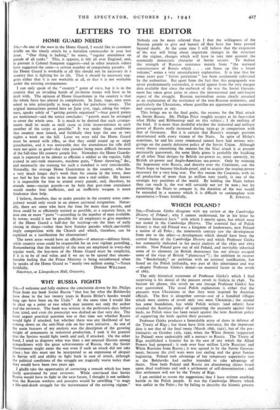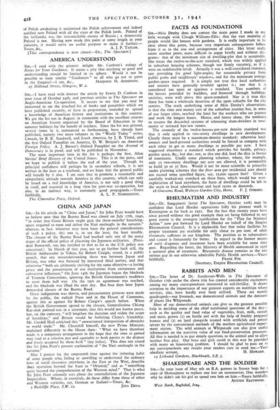WHICH POLAND ?
Snt,—Professor GOrka disagrees with my review of the Cambridge History of Poland ; why I cannot understand, for in his letter he " restates historical facts " with which I mostly agree, but which were not stated in the Cambridge History. The essential fact of Polish history is that old Poland was a kingdom of landowners, new Poland a nation of all Poles ; the nineteenth century saw the development from one to the other—a development which should have been the central theme of the Cambridge History and which Professor Garka has summarily indicated in his social analysis of the 1830 and 1863 revolts. New Poland grew out of old Poland, and inevitably inherited some of its elements (as British democracy has not always escaped some of the vices of British " plutocracy ") ; the ambition to recover the "Borderlands," an ambition with no national justification, but based on the Polish latifundia, was part of this inheritance and was —despite Professor Gorka's denial—an essential factor in the revolt of 1863.
The only historical statement of Professor GOrka's which I find surprising is his denial of the peasant revolt in Galicia in 1846. To borrow his phrase, this revolt no one (except Professor Garka) has ever questioned. The usual Polish explanation is either that the peasants were Ukrainians or that they were inspired by Austrian officials. The first is altogether untrue—out of a hundred villages which were centres of revolt only two were Ukrainian ; the second has some foundation, but while Polish writers (and others) have attacked the Austrian policy of supporting the peasants against their lords, no Polish voice has been raised against the later Austrian policy of supporting the lords against their peasants.
Professor Gorka produces a formidable array of dates in defence of the Treaty of Riga ; but these have little relevance, for the important date is not that of the final treaty (March 18th, 1921), but of the pre- liminaries on October 12th, 192o, when the White Armies (supported by Poland) were undeniably still a menace to Russia. The Treaty of Riga established a frontier far to the east of any which the Allied Powers had proposed ; it took over four million Little Russians and White Russians from Russia ; it was agreed to by the Soviet Govern- ment, because the civil wars were just ending and the great famine beginning. Poland took advantage of her temporary superiority just as the Bolsheviks had earlier intended to take advantage of theirs. Now both Poland and Russia are abandoning claims based upon dead traditions and seek a settlement of self-determination ; and that settlement will not be the Treaty of Riga.
I am entitled-to resent the suggestions. that I -have written anything hostile to the Polish people. It was the Cambridge History which was unfair to the Poles ; for by failing to describe the historic process of Polish awakening it minimised the Polish achievement and indeed saddled new Poland with all the vices of the Polish lords. Poland of the latifundia was the irreconcilable enemy of Russia ; a democratic Poland is not. Having now made this point at some length in your columns, it would serve no useful purpose to make it further.—























 Previous page
Previous page